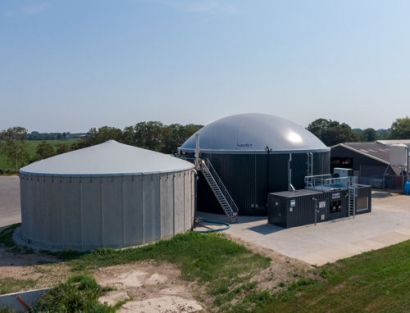
The Netherlands will soon have 15 Microferms, of which two-thirds with a total biomethane production of approximately 3.2 million cubic meters (Nm3) per year. The rest produce green electricity and heat with a CHP. The five new Microferms are being built at dairy farms in Blokzijl (Overijssel), Boornbergum (Friesland), Lekkum (Leeuwarden), Ell (Limburg) and Achtmaal (Brabant). The installations produce 40 Nm3 of biomethane per hour from 12,000 to 16,000 tons of manure per year. The annual capacity is 320,000 Nm3 of biomethane that is suitable for distribution via any existing or new (natural) gas network. Thanks to one Microferm, approximately 240 households can heat and cook with the sustainable natural gas substitute all year round.
Microferm manure digestion with Jumpstart
HoSt works together with the Jumpstart cooperative, an initiative of dairy company FrieslandCampina. Within FrieslandCampina’s Jumpstart initiative, HoSt is a qualified supplier of the Microferm mono-manure digester with a biomethane system. The Microferms under construction, and the two recently realized Microferms in the Dutch Koudum and Merselo, are Jumpstart projects. This collaboration facilitates the development of profitable manure digestion at dairy farmers for the production of sustainable energy and the reduction of greenhouse gases on the dairy farm and in the sector. In 2018, HoSt signed the first Jumpstart Microferm project. This biogas plant successfully produces sustainable gas in Merselo in the Dutch province Limburg.
Worry-free Ownership of Microferm Digester
HoSt has developed the Microferm manure digester for farmers who want to operate a manure digester in a profitable way and with little effort. Anyone who wants to build and operate a Microferm need certain permits. HoSt can fully take care of the permit application if desired. This way, the dairy farmer does not have to worry about this.
“It is great that we are moving towards a more and more sustainable dairy sector, but that sometimes demands quite a lot from the dairy farmer. We are pleased that we can unburden the farmer with the permit application. With the realization of another five Microferms, we prove that manure digestion can be profitable and sustainable,”says sales engineer Lieuwe de Boer of HoSt.
Reducing emissions thank to mono-manure digestion
The knife cuts both ways in the case of mono-manure digestion: replacing gray energy with green energy and reducing ammonia and methane emissions on the dairy farm. Research shows that timely storage of fresh manure in a closed tank reduces methane and ammonia emissions from the manure storage below the barn. The manure digester is basically a gas-tight, heated, insulated tank with a mixer. In this tank, the manure is anaerobically digested under controlled conditions, converted into biogas and using a biogas upgrading system with membrane technology upgraded to biomethane. This way, the methane is not released in the air ánd is optimally used. With one HoSt Microferm mono-manure digester, the entire natural gas consumption of approximately 300 homes can be made sustainable.
The power of simplicity
The strength of this ‘mini’ biogas plant lies in its simplicity with proven technology, the low risk and an investment that is manageable. The Microferm is a compact installation with the control system, heat recovery and biogas upgrading in one unit. The digester is equipped with a patented insulated double membrane roof for extra heat savings. Thanks to automated technology, the installation can be monitored online remotely via a very user-friendly control environment. The dairy farmer only carries out a quick check round every day of up to 15 minutes.
Manure is valuable
Manure is a valuable raw material. HoSt’s mission is to obtain as quickly and as much green energy as possible from this valuable raw material, but also from other organic residual flows, in the most sustainable way. In addition to manure digestion, the Microferm can easily be expanded with a nitrogen stripper for manure/digestate treatment, because the temperature of the digestate and the fact that nitrogen can be stripped much more easily through mono-manure digestion. Processing of the manure, also known as manure valorization, using a nitrogen stripper results in a closed cycle.

